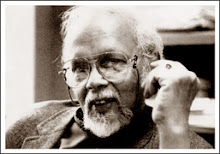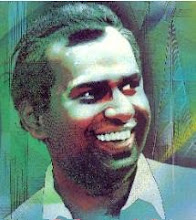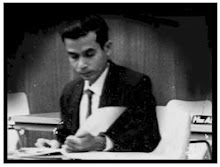Source: The Nation
Date: 24/01/2010
It’s been 11 years since a suicide bomber claimed the life of distinguished legislator and politician Neelan Thiruchelvam. This year, to celebrate his 66th birth anniversary, which falls on January 31, the Neelan Thiruchelvam Trust has organised three cultural events, under the theme ‘A Celebration of Diversity,’ to celebrate Dr. Thiruchelvam’s life and his passion for various aesthetic art forms.
The Nation met up with playwright and director Rajitha Dissanayake, who directed plays such as ‘Weeraya Merila’ (The Hero is Dead) and Sihina Horu Aran (Dreams have been stolen). His play ‘No Return’ or ‘Apasu Herenda Be’, which won six awards at the 2009 National Drama Festival, including Best Director and Best Drama, will go on the boards for its 50th outing, at the Neelan Thiruchelvam birth anniversary celebration.
The play tells the story of Ajith, a graduate from America, who returns to his country with a PhD. On his return home with his wife Sumudu and a young child, he joins a State ‘media centre’ as a director. He wants transparency and accountability there, but those are the last things he finds within the Centre, which controls pretty much everything that gets to people through mass media. “Truth” has a different meaning at the Centre, and it is the central institution that disguises State agendas and ideologies as “truth.” Ajith’s almost ‘American’ idealism and naivety makes him believe that he can bring transparency into the Centre, and before long, he finds himself fighting a lonely battle against corruption and those who value personal gains more than the ‘truth.’ Once Ajith is trapped in this structure of corruption, he has “No Return.” One can return home from a foreign country, but to return home from one’s own State is not easy.
Q: First of all, what inspired you to create a play around this particular theme
A: I came up with this story when I was in America on a scholarship. That was when the war in Iraq heightened and I started to feel how the media manipulated the thoughts of individuals through the close manipulation of information. This, I believe, even us as Sri Lankans have experienced through the war that existed in our country for years. That is why the theme of this play surrounds the individual who enjoys life to the fullest, trying to give himself an almost supper human clarification, yet he is in search of the greater man within him. The story revolves around the contemporary theme of how information is manipulated by those with power, and the consequences faced by those who go against them. It is about those who experience life to the fullest, and the consequences they face when they lose their luxury, and how those who challenged them enjoy their plight
Q: So far, what sort of a reaction did you get for your play?
A: We have done 49 shows in Sri Lanka, and the performance at Dr. Thiruchelvam’s memorial concert will be our 50th. We did a number of shows within Colombo and at outstation venues. After we did a few shows for academics and university students, it brought on widespread discussion, especially the dialogue that developed within university forums, brought on a big impact. I must say that, as dramatists, we expect our work to have a good impact on society, and the impact this play had was quite noteworthy.
Q: What sort of support did you get from your cast?
A: They were very cooperative. And the script of this play gives the actor full control on stage. So the actors had plenty of freedom to experiment with their characters, I believe it paid off, when we won the awards for Best Actor and Best Supporting Actress at the National Drama Festival.
Q: Did you pay any special attention when it came to lighting and stage setting?
A: As I said before, I allowed more room for the actors. Even the lighting in this play was used only to highlight the acting. And I tried to keep the stage setup as minimal as possible. There are seven scene changes in this play, and we refrained from using blackouts to separate the scenes. What we did instead was to use a soliloquy at the end of each scene. This allowed the characters to connect better with the audience. The soliloquies are delivered under the spotlight, while the rest of the stage remains darkened, giving the crew the time necessary for a swift set change.
Q: Have you performed this outside Sri Lanka?
A: No, not yet, but we are translating the script into English at the moment. However, my previous plays Dreams Stolen and The Hero is Dead were performed for audiences abroad
Q: We talked about the critical acclaim your play received and how the audience reacted to it, so, as a director, how do you feel about the journey you’ve travelled so far?
A: Well, as artistes, the greatest pleasure that we have is when our audience shows that they can truly connect with our work. I felt that pleasure when some of the members from the audience came to me and said that there were instances in the play that they could truly relate to, and that the resemblance between some of the scenes and their actual life was truly hilarious, and at the same time thought provoking
Q: Finally, could you name the cast and crew in the play?
A: Yes the play stars Saumya Liyanage, Bimal Jayakody, W. Jayasiri, Gayani Senanayake, Dharmapriya Dias, Prasad Suriyarachchi, Sham Fernando, and Anuthra Subesinghe. Music direction was by Theje Buddika and the play was produced by Freedom Theatre group.




































No comments:
Post a Comment